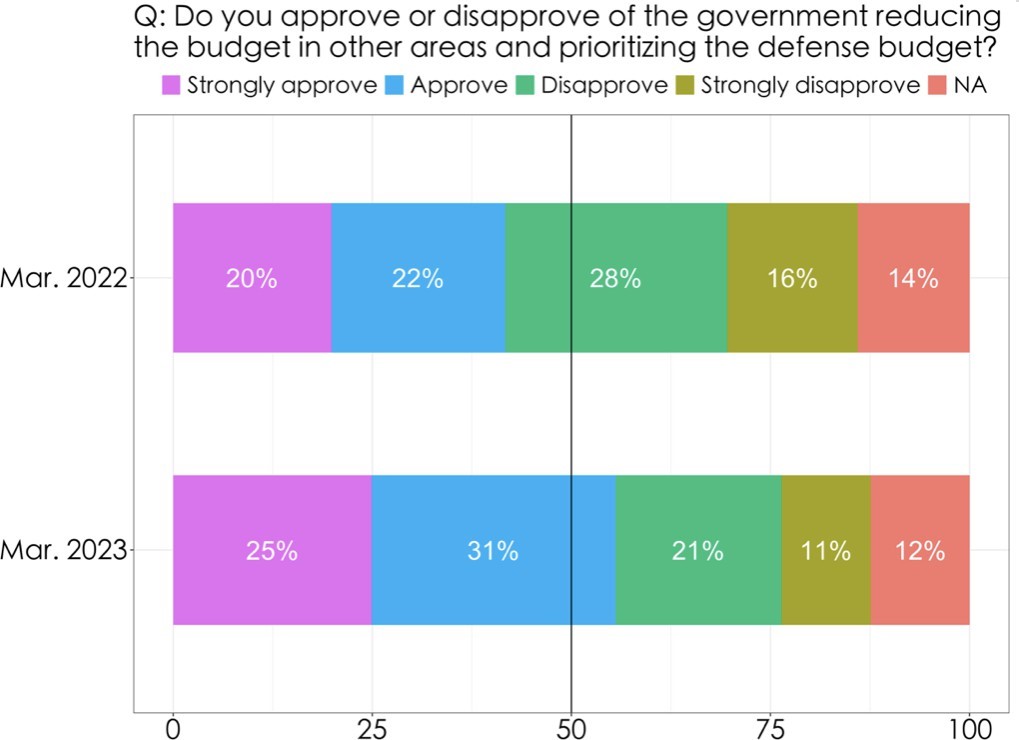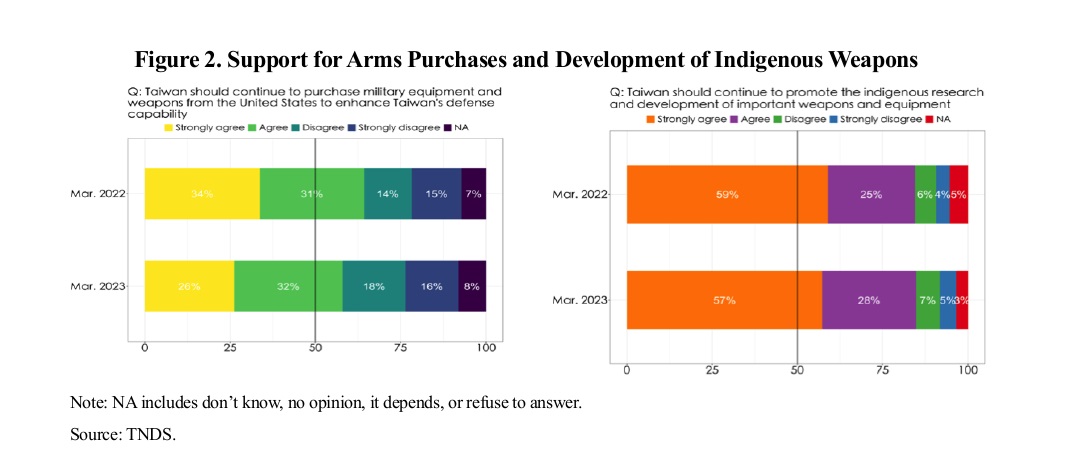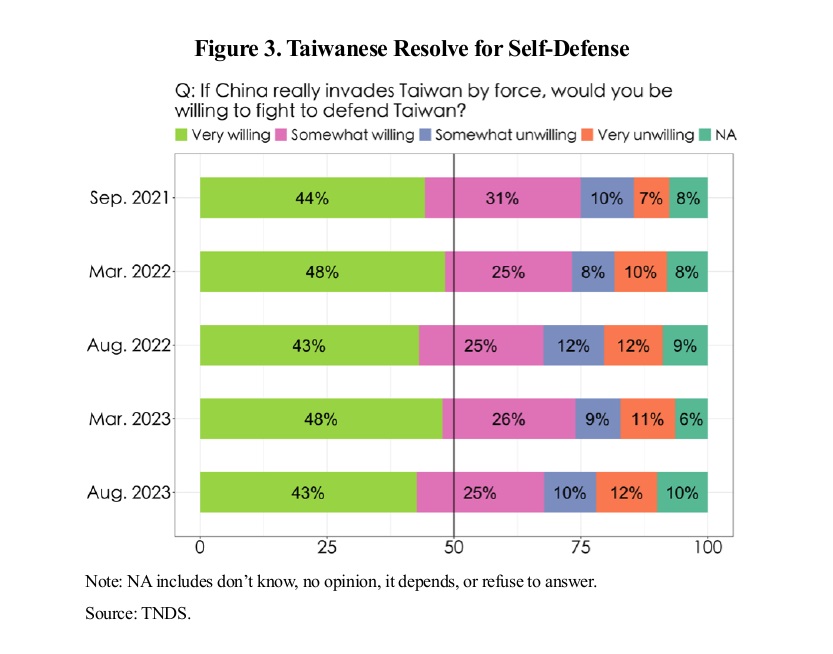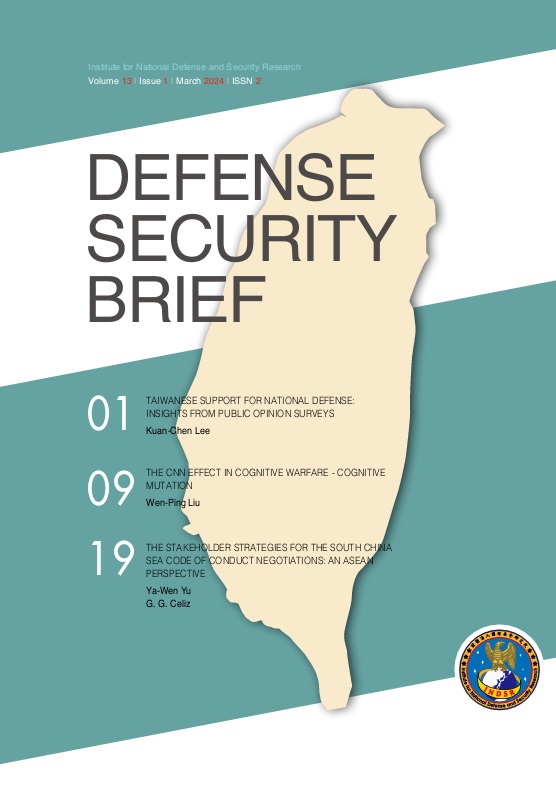TAIWANESE SUPPORT FOR NATIONAL DEFENSE: INSIGHTS FROM PUBLIC OPINION SURVEYS
2024.05.17
Views
1734
INTRODUCTION
Recently, the United States has grown more apprehensive regarding the potential of a People’s Republic of China (PRC) invasion of Taiwan. The widening cross-strait capability gap, stemming from substantial investments in the People’s Liberation Army (PLA), has given rise to growing concern. Consequently, there is a growing call for Taiwan to increase its defense budget, invest in asymmetric capabilities, upgrade tactical strategies, and demonstrate strong determination for self-defense.[1]
In the past few years, the Tsai Ing-wen administration has been focused on strengthening Taiwan’s defense, including gradually increasing the defense budget, promoting independent defense, improving the reserve system, and extending compulsory military service to one year. While these policy changes signify Taiwan’s commitment to enhancing its defense capabilities, few studies explore Taiwanese attitudes toward national defense from a public opinion perspective. In democracies with regular elections, political leaders are ultimately accountable to voters and thus public views on security and defense may constrain the options of decision-makers and prompt certain courses of action.[2]Therefore, this article seeks to employ a series of surveys commissioned by INDSR and conducted by the Election Study Center at National Chengchi University to investigate the supportive attitudes of the Taiwanese public toward national defense.[3]
The remainder of this article proceeds as follows: Section 2 outlines the cross- year trends in public opinion regarding increasing defense spending. Section 3 focuses on exploring issues related to arms acquisition, analyzing the public attitudes toward arms purchases from the United States and the development of indigenous weapons. Section 4 utilizes survey data to analyze the changing trends in self-defense awareness of the Taiwanese public. Finally, the conclusion summarizes our preliminary findings and policy implications.
SUPPORT FOR INCREASING DEFENSE EXPENDITURE
According to data from the China Power Project of the Washington-based think tank Center for Strategic and International Studies (CSIS),[4]the PLA not only routinely operates military aircraft and ships in the sea and airspace surrounding Taiwan, but also is continuously escalating the frequency and intensity of military encroachment. China poses a significant threat to the peace and stability of the Taiwan Strait. Previous studies suggested that the public’s perception of threat plays a crucial role in influencing their support for the growth of the defense budget.[5]In this paper, we assess public attitudes toward defense expenditure using a survey item that asked respondents, “Do you approve or disapprove of the government reducing the budget in other areas to prioritize the defense budget?” Figure 1 plots the changes in attitudes toward defense spending among the people of Taiwan between 2022 and 2023.
The results indicate that in March 2022, approximately 42% of respondents favored prioritizing an increase in the defense budget. However, in the second wave of the survey conducted in March 2023, over 56% expressed support for reallocating funds from other areas to prioritize an increase in the defense budget. In addition, a recent report also pointed out that most Taiwanese citizens believe the defense budget is insufficient and conditionally support raising it to 3% of GDP.[6]These results suggest that Taiwanese citizens endorse augmenting defense expenditure to address the growing military threat posed by the CCP.
Figure 1. Public Attitudes toward Defense Budget

Note: NA includes don’t know, no opinion, it depends, or refuse to answer.
Source: TNDS.
SUPPORTING ARMS PURCHASES AND DEVELOPMENT OF INDIGENOUS WEAPONS
In addition to endorsing an increase in the defense budget, the Taiwanese public also demonstrates its commitment to strengthening defense capabilities through support for arms purchases from the United States and the development of indigenous weapons.[7]
The left panel of Figure 2 depicts public attitudes toward arms purchases from the United States between 2022 and 2023. In March 2022, about 65% agreed with the statement that “Taiwan should continue to purchase military equipment and weapons from the United States to enhance Taiwan’s defense capabilities.” In the second waveof the survey in 2023, while there was a slight decrease in the proportion of support for purchasing weapons from the United States, six out of ten respondents still expressed agreement with military procurement.
The Taiwanese government has actively involved civilian efforts in promoting independent defense. In addition to domestically produced warships like the Tuo Chiang-class ( 沱江 ) and Yushan-class ( 玉山 ), and the production of the Brave Eagle ( 勇鷹 ) advanced jet trainer, a domestically built submarine prototype named Hai Kun ( 海 鯤 ) has successfully undergone underwater testing. These tangible achievements have garnered public support for the independent development of critical weapons systems. As illustrated in the right panel of Figure 2, approximately 85% of the respondents approved the development of indigenous weapons. The overwhelming support for independent defense indicates a keen awareness among the public of the rapidly changing international situation. To ensure that national defense remains unaffected by fluctuations in the global environment, Taiwan should persist in promoting the indigenous research and development of key weapons systems.

DEMONSTRATING STRONG RESOLVE FOR SELF-DEFENSE
One of the most crucial lessons Taiwan can draw from the Russo-Ukrainian War is the importance of maintaining unwavering determination in the face of an adversary. With this kind of resolve, even a small country can stand up to a formidable foe. In fact, as advocated by Taiwan’s former Chief of the General Staff Lee Hsi-min, demonstrating the determination to resist an adversary is an indispensable key element at all levels, whether in “avoiding war,” “deterrence of war,” or “winning war.”[8]Using survey data, we examine whether the people of Taiwan have sufficient willingness to resist a potential Chinese invasion.
The TNDS has asked respondents since 2021: “If China really invades Taiwan, would you be willing or unwilling to fight to defend it?” The results are shown in Figure 3. Overall, the people of Taiwan demonstrate a consistent level of determination to resist, with the percentage willing to defend Taiwan fluctuating between 65% and 75% over the years. The polling data on Taiwan’s willingness to fight surpasses that of Ukraine before the Russian invasion of Ukraine.[9]However, it is important to highlight that the willingness of Taiwanese people to resist experienced a significant decline after large-scale military exercises by the CCP. For instance, following the CCP’s encirclement military exercises around Taiwan in August 2022, the percentage of Taiwanese willing to resist decreased by about 5% compared to the previous survey. Additionally, after President Tsai Ing-wen’s diplomatic visit with stopovers in the U.S. in April 2023, the PLA conducted another major military exercise, resulting in a further decline in the August 2023 survey figures. This suggests that the CCP’s military exercises may have a temporary impact on the morale and sentiments of the Taiwanese people. The fluctuations in people’s willingness to resist the enemy could be attributed to the CCP’s cognitive warfare against Taiwan. According to observations by the Taiwan FactCheck Center,[10]both the PLA’s military drills in August 2022 and April 2023 involved extensive information manipulation, fostering a societal atmosphere of fear of imminent war. Therefore, in the short term, Taiwan needs to strengthen its social and psychological resilience to mitigate the impact of disinformation campaigns on public morale. In the long term, sustaining the resolve of Taiwanese citizens to resist requires enhancing the capabilities of the Taiwanese military, fostering cooperative relations with allies, and solidifying a consensus within Taiwan.[11]

CONCLUSION
Through analyzing public attitudes toward defense budgets, weapon acquisition, and self-defense, this article explores Taiwanese citizens’ support for national defense. Our research reveals that most Taiwanese citizens favor increasing the defense budget, approve of arms purchases from the U.S., and advocate the development of indigenous weapons. Furthermore, there is a certain level of willingness to resist in the event of a Chinese invasion of Taiwan. These pro-defense sentiments not only play a crucial deterrent role against China’s ambitions for Taiwan but also act as a loudspeaker, conveying Taiwan’s determination to defend itself to the international community. In the face of growing threats from China, the new government following the 2024 Taiwan elections, regardless of which political party takes power, should not overlook the public’s expectation of strengthened national defense. This article does not advocate engaging in an arms race with China, but Taiwan’s security should not depend solely on the goodwill of mainland leaders. Taiwan must continue to invest wisely in national defense, enhancing its military’s capabilities and readiness within the constraints of limited resources. Furthermore, the new government’s defense policy should maintain open communication with the populace, seeking their support and mobilizing all-out defense efforts. Only by doing so can Taiwan make the Chinese leadership aware of the heavy costs of war and deter them from initiating an invasion.
[1] David A. Ochmanek et al., Inflection Point: How to Reverse the Erosion of U.S. and Allied Military Power and Influence (Santa Monica, Calif.: the Rand Corporation) , 39-41.
[2] John H. Aldrich et al., “Foreign Policy and the Electoral Connection,” Annual Review of Political Science, 9 (Jun. 2006) , 447-502.
[3] The data used herein are taken entirely from the Taiwan National Defense Survey (TNDS) of the Institute for National Defense and Security Research (INDSR) (https://indsr.org.tw/safetyInvestigation?uid=45). The TNDS is conducted by the Election Study Center of National Chengchi University on behalf of INDSR. The author would like to thank the aforementioned organizations for providing the data. However, the contents of this article are the sole responsibility of the author.
[4] Gerald C. Brown and Ben Lewis, “Taiwan ADIZ Violations,” China Power Project (CSIS), https://chinapower. csis.org/data/taiwan-adiz-violations/, access date: Sep. 14, 2023.
[5] Erik M. Fay, “Individual and Contextual Influences on Public Support for Military Spending in NATO,” Defence and Peace Economics 31, no. 7 (Sep. 2019) , 762-785.
[6] Kuan-chen Lee, “min zhong you tiao jian zhi chi guo fang yu suan zeng jia zhi GDP de 3%” [ 民眾有條件支持國防預算增加至 GDP 的 3% Citizens Conditionally support increasing the Defense Budget to 3% of the GDP], guo fang an quan ji shi ping xi [ 國防安全即時評析 Real-time Analysis] Dec. 11, 2023, https://indsr.org.tw/focu s?typeid=38&uid=11&pid=2681.
[7] Public support for defense, particularly in terms of arms purchases, is constrained by the overall scale of the national budget. This issue mirrors the commonly referenced concept in literature known as “guns versus butter” — the trade-off between military expenditure and domestic spending. However, policies in democracies may face difficulty in implementation if they lack public support, even with sufficient financial budgets. Hence, this issue is not just about budget constraints. Furthermore, as NATO requires member states to spend 2% of their GDP on defense, this defense expenditure, including arms purchases, symbolizes a country’s commitment to self-defense and collective security.
[8] His-min Lee, tai wan de sheng suan yi xiao zhi da de bu dui cheng zhan lüe quan tai wan ren du ying liao jie de zheng ti fang wei gou xiang [ 台灣的勝算:以小制大的不對稱戰略,全台灣人都應了解的整體防衛構想 The Overall Defense Concept: An Asymmetric Approach to Taiwan’s Defense] (Taipei: Linking, 2022), 184- 187.
[9] Multiple polls indicated that the Ukrainian willingness to resist was at a rate around 52% before the Russian invasion of Ukraine. See Tor Bukkvoll and Frank Brundtland Steder, “War and the Willingness to Resist and Fight in Ukraine,” Problems of Post-Communism, (Dec. 5, 2023) https://www.tandfonline.com/doi/full/10.108 0/10758216.2023.2277767?src=exp-la.
[10] “Nancy Pelosi’s Asia Tour,” Taiwan FactCheck Center, https://tfc-taiwan.org.tw/topic/7969. “Apr. 2023 President Tsai’s Oversea Trip VS. China Military Drills,” Taiwan FactCheck Center, https://tfc-taiwan.org.tw/ topic/9049.
[11] Kuan-chen Lee and Ching-hsin Yu, “wei tai wan er zhan? lie xiang shi yan de tan suo” [ 為台灣而戰?列項實驗的探索 Fighting for Taiwan? An Exploration Using List Experiments], wen ti yu yan jiu [ 問題與研究 Issues & Studies] 62, no. 4 (Dec. 2023), 105-134.
#國防安全民意調查


